Today’s question: can dogs eat watermelon? Is watermelon good or bad for dogs? Scroll down for detailed answers.
The watermelon, thought to originate from southern Africa, is certainly one of the healthiest foods for human consumption, but does this mean that can dogs eat watermelons? Most may answer ‘yes, of course!’ Offering the sweet treat to dogs should have the same impact on the K9 as on the human. Watermelon offers a variety of natural vitamins and minerals when digested.
The best benefit of watermelon is the amount of water consumed! Watermelon is made up of mostly water, therefore, when a body needs hydrating, adding watermelon to the diet can help reinforce the hydration of those in need. Just as with human consumption of the fruit, dog consumption of the fruit should be monitored and assessed to determine whether a dog truly should be given watermelon.
When determining whether to offer your dog watermelon, first identify the fruit itself as well as potential triggers/hazards that may arise. The fruit has a smooth but very hard outer skin, usually green with darker green stripes known as the rind, and a juicy red or pink fruit inside, dotted with many black seeds. Watermelon can be grown in a person garden, on a farm, or bought at a market and grocery store.
Watermelons may be bought and consumed with or without seeds, and also with or without the rind. Cubed watermelon is an efficient method in which to offer nutrition and hydration without much effort on your part. Seedless, cubed watermelon offers the treat your pup deserves as well as the hydration your pup needs. Without the rinds or the seeds on the melon, the fruit becomes a safe and welcome food addition.
If you prefer to save money and complete tasks on your own, buying a whole watermelon is the cheaper method of offering watermelon as a snack to your pup. Buying a whole watermelon with the rind will mean you as the buyer must cut the rind, cut pieces of watermelon, cube the melon into bite size pieces, and pick out any seeds that may be lingering. While cutting the watermelon may be more time consuming than buying precut fruit, the method does not take more than a few minutes at a time and may easily be added onto any cooking regime already in place. The benefits of adding watermelon to the diet of a dog far outweigh the potential hassle of cutting and cubing.
Should you be giving watermelon to your dog?
Watermelon: A refreshing, hydrating and juicy fruit, loved by all the family. If you, your family, and friends all love and enjoy watermelon, what about your dog…
Can dogs eat watermelon? The answer is, unfortunately, not a straight yes or no. Rather than a ‘yes’, watermelon should be given modestly and only with precautions.
Watermelon may seem to be a very simple and healthy treat for all to enjoy; however seeds, rinds, and large bites of the melon can be damaging the inner body of a dog. Seeds and rinds present choking hazards that can be avoided by either not offering these bits of the melon, or by peeling, cubing, and eliminating seeds before offering the fruit.
There are many ways in which to enjoy the benefits of adding watermelon to your diet, or the diet of your dog! Whether for breakfast or dessert, made into a juice or smoothie, this fruit may be enjoyed many different ways. There is a special Chinese tradition of eating the seeds as a special Chinese New Year treat. Perhaps you as a dog lover can pick out the seeds of watermelons cut by hand, preserve the seeds, and then bake then at Chinese New Year as an offering to your human friends! Saving and preserving seeds can be a welcome addition to your composting and recycling habits, simply by not wasting this important part of the fruit.
Watermelon is a versatile fruit that is a sure fire winner. There are more than a 1000 different varieties of watermelon, varying in size and sometimes color inside. The color inside the melon can vary from the traditional red or pink to an orange, yellow or white color. You may find your pet prefers a certain type of texture and tang to their watermelon. Depending upon your region, and the season in which your region is growing in as far as farming/harvesting, the color of the melon can lead you to the right taste preference most enjoyed by you and yours.
Health benefits of watermelon
First the good news. Watermelons, like for us humans, are a great source of vitamins and nutrients for dogs. Watermelons are rich in Vitamin A, which is a fat soluble vitamin and is stored in the fat cells (lipocytes) within a dog’s body.
Vitamin A is important for keeping the skin healthy and maintaining a glowing coat. It assists with the growth of the dog and also helps with night vision, useful in many situations (especially if Fido has night duty guarding the family home…)
Vitamin B-1, also known as Thiamine, is present in watermelons and helps to maintain a dog’s appetite, keep their reflexes sharp, maintain their general strength and improve nervous system resilience.
Another vitamin found in watermelons is B-6, also known as pyridoxine. This is used by the body to process amino acids, making it an essential part of a dog’s requirements. Deficiencies in pyridoxine can lead to poor growth, tooth cavities, lesions on the skin, kidney stones and anemia.
They are also a great source of Vitamin C. While dogs can produce their own vitamin C supplies (unlike humans) it is still useful in maintaining a healthy dog, through the improvement of the immune system by enhancing white blood cell activity.
The presence of Potassium, which is a macro mineral, helps dogs maintain efficient functioning of enzymes, nerves and muscles. Magnesium is also found in watermelons and has benefits for your canine buddy. Behind potassium, manganese is the second most abundant substance in the cells of dogs, and is required for many metabolic functions, and works as an instigator or catalyst for many hundreds of enzyme systems.
As the watermelon is over 90% water – the clue is in the name people – it is also a great source of hydration if your dog is sweating from a hot day or strenuous exercise. Watermelon truly is a bona fide thirst quencher for you and your dog. The watermelon is also packed with useful antioxidants which are useful in the neutralization of free radicals, which left uncontrolled can cause great damage in the body.
Also, watermelons are sugar free and low in calories – great for you and your dog if trying to watch the pounds!
Many dogs love to play outside unsupervised, or in large play areas such as kennels. Dog bowls are often knocked over or used up before a human notices and is able to refill the bowl. In the event of bowls remaining empty of water, offering watermelon bits to dogs as a treat may also end up saving their life. A dehydrated dog cannot function well for long and can literally die of thirst. In the event a dog is dehydrated, quick hydration is key. Watermelon can be offered to a dog in need to prevent dehydration while water is found, bowls are refilled, or dogs are moved into the shade to lower body temperature.
For a dog who does not wish to drink out of a traditional dog bowl or has had surgery on the muzzle, watermelon may offer the life saving nutrients and hydration needs to prevent the dehydration process from beginning. Watermelon has so many tried and true benefits for dogs, that using watermelon in times of crisis also serves a purpose than simply offering as a treat.
Check out this fun video that teaches you how to make delicious frozen watermelon treats for your pooch. The recipe contains 3 ingredients: coconut milk (or coconut water), watermelon, and honey (optional):
Can dogs eat watermelon rind?
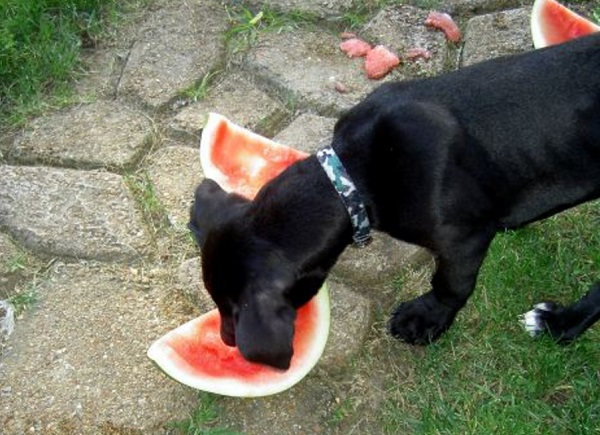
No, dogs should not eat watermelon rind. Dogs may have hard time digesting it properly. Not to mention that it is a chocking hazard for your pooch. Why take the risk?
Additionally, it doesn’t provide your dog with the same health benefits that it holds for humans.
Can puppies eat watermelon?
Ye, you can give watermelon to puppies. However, puppies need to be old enough to digest solid foods (over 6 months old). Puppies that are under 6 months old should eat puppy food.
Make sure to start slowly and gradually when introducing watermelon to your pup’s diet.
Are there any drawbacks?
Watermelon has so many positive aspects, that there has to be the bad news waiting on the other ends. Well no bad news, just a few words of caution for you and your pup.
Firstly, the seeds can cause an intestinal blockage. Like those fussy eaters you see picking out the individual seeds, it is important to remove the seeds for the dogs. Humans can view and pick out their own seeds to their personal preference. In the event a human swallows a seed, damage will not be done. However! In the event of a dog eating seeds, they are without the ability to pick out seeds and the ability to digest them without hazard. While watermelon seeds pose much less risks than other pit or seeds in different fruits, it is better to keep them away from the dog.
Also, the rind can cause gastrointestinal problems, while offering none of the nutritional value mentioned above that is found in the fruit itself. No point in risking potential problems for zero benefit.
Too much of anything is bad for you, and a sudden increase in watermelon intake may cause changes in the bowel movements. Diarrhea is a definite possibility. This does not mean it is harmful, just that (like most fruits) dogs have a slightly harder time digesting it.
The best offering to a dog you can give, is to start offering watermelon slowly to determine the tolerance of the melon within the dogs digestive system. When tolerance is established, you may offer your dog more melon as time goes on.
How to prepare watermelon for dogs
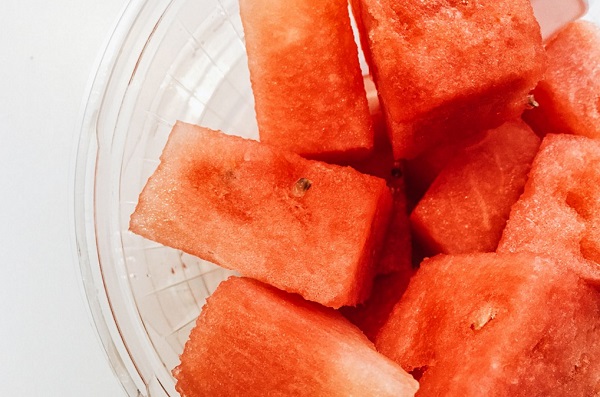
It’s pretty simple to prepare watermelon for your pooch. Start out with washing the watermelon thoroughly in case it has any pesticide residue on. After that, cut the rind and seeds out. Make sure all the seeds are picked off the watermelon. Even if your watermelon is seedless, double check if it contains any seeds. Usually, seedless watermelons have few white, almost transparent seeds. Take these seeds out too.
Slice the watermelon in bite-size pieces and offer them to your dog. Remember, moderation is key. Moreover, start out with couple slices and see how your dog reacts to this fruit. If everything seems fine, you can keep giving your dog watermelon.
What to do if your dog ate too much watermelon
If your dog accidentally ate too much of this fruit, he/she will most likely experience diarrhea. You may want to place your dog outside or somewhere where it would be easier for you to clean up after him.
Make sure your pooch has enough fresh drinking water since he/she may become dehydrated. Observe your pet carefully for the next 24 hours. If your dog’s condition has not improved after 24 hours has passed, you should consult with your veterinarian.
Conclusion
Is it a fruit or it is a vegetable? Who cares (Oklahoma, that’s who, where it was officially declared the state vegetable, sparking outrage and controversy), it tastes great and with the necessary precautions you can enjoy it with your favorite four legged canine friend.
A slice of watermelon certainly makes for a great treat, with plenty of goodness packed inside, just make sure all seeds (as well as any leaves or stems) are removed first to avoid any problems.
Two or three pieces about an inch in size is more than sufficient to give your furry friend a delicious, nutritious and hydrating snack. Maybe next time you go for a long walk on a hot day, take some with you to share.
References:

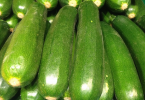
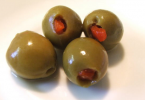

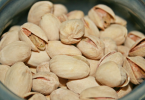


Leave a Comment